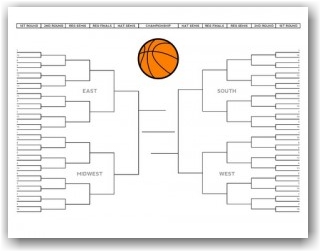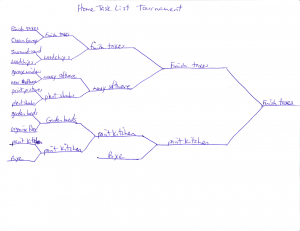
Tournament Brackets: Not just for March Madness, but also for your life.
My posts over the last week or so have dealt with how stress and busyness can keep us from living a balanced life and achieving true success in our life and work.
For many, the major cause of stress and busyness is the choices (or lack of choices) that we make.
I’ve observed in my own life that it’s not the choice between a good activity and a bad activity that causes my life to get out of balance. In fact, those choices are usually quite obvious, and quite simple to make.
Rather, it’s the choice between two seemingly good activities that can lead to stress if I have no basis for making a decision and no plan for prioritizing them.
The recent NCAA March Madness basketball tournament reminded me of an interesting – and fun – technique to help make decisions and clarify priorities between any number of seemingly good or equal choices.
This technique, called tournaments, is described in the book, The On-Purpose Person: Making Your Life Make Sense, by Kevin W. McCarthy.
The idea is that if you have a bunch of seemingly equal goals or lists of wants, dreams or tasks that you need to prioritize, you make them compete against each other using a tournament bracket just like in the NCAA basketball tournament.
The first step is to put your list on paper. McCarthy suggests that as you make your list, you alternate writing the items from the top to the bottom of the page, so that as you write, your list converges in the middle.
You can see from my sample that item #1 goes at the top, and item #2 goes at the bottom. I alternated back and forth until item #11 rounded-out the middle.
Next, you’ll want to create tournament brackets and place each item from your list, one at a time, in the brackets. You can see from the next sample that I’ve placed the list items on the bracket in the order of how they appear on the list from the top.
So item #1 and #3 play against each other first, then items #5 and #7, etc. If you have an odd number of tasks, like I did in the sample, you’ll have a few “byes”, where that task automatically advances to the next round.
The winner of each competition goes on to the next round until you have a winner, which becomes your top goal or core priority to focus on first.
This doesn’t mean the other goals or tasks are “losers”, it just means that they are lower in priority, and will get less attention, at this time.
If you’re like me and you struggle from time to time with analysis paralysis, this will force you to HAVE to choose. Don’t sit and agonize over a choice. Just go with your first instinct.
When you’re done, take some time to think through your decision making process. What was your rationale for deciding that one item was more important than another? What things seemed more important to you as you made each decision? By taking the time to do this, you’ll identify some values that will help to guide you for future decision making.
I love how quickly these tournaments help you clear away the clutter. You can use them to discern your core priorities within each life area, prioritize daily tasks, focus your thinking on major projects, and more.
In fact, you’ll see in the samples that I used tournaments to prioritize my task list for things I need to do at home. My wife will be so happy!
Have you ever tried tournaments before? If so, how’d it go? If not, do you think you’ll give them a try?
You might also like:
- The decision making process:Â 7 strategies for success
- Know your life’s purpose? Make great decisions
- Reduce work stress:Â Do your most important work first






tvtropes.org
How to Clarify Your Priorities the “March Madness” Way